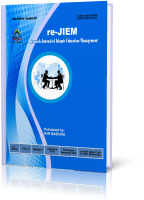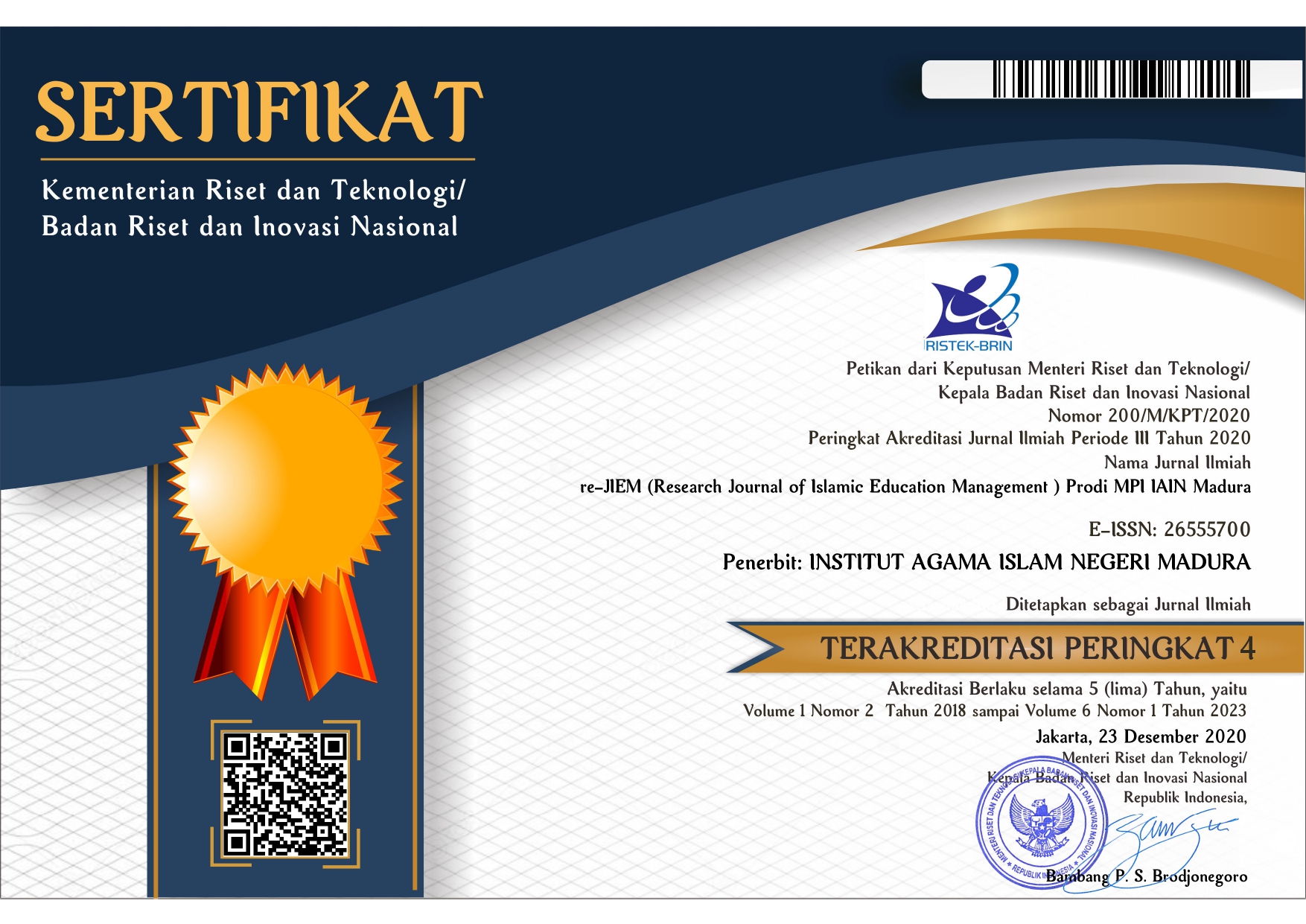MANAJEMEN STRATEGIS DALAM MEWUJUDKAN SEKOLAH PEDULI DAN BERBUDAYA LINGKUNGAN
 Abstract views: 226
,
Abstract views: 226
,
 PDF downloads: 248
PDF downloads: 248
Abstract
This study aims to analyze strategic management in creating an environmentally conscious and cultured school at SMPN 2 Larangan. With a descriptive qualitative approach, we collected data through interview, observation, and documentation methods. Data sources consisted of the principal, teachers, educators, and students. To analyze the data, this study used the Miles and Huberman model which involved three stages: data condensation, data presentation, and drawing conclusions. The findings of this study indicate that SMPN 2 Larangan has implemented environmental strategic management through three main steps, namely: strategy formulation, implementation, and evaluation. The strategy formulation process is carried out by integrating environmental aspects into the school's vision, mission, and curriculum. The formation of the Adiwiyata team involving 16 working groups (Pokja) and 76 students as environmental cadres is the key to the strategy. The implementation of the program includes various innovative initiatives such as water and energy conservation, waste management, plant maintenance, and development of environmentally based products. The school has also revamped the Learning Implementation Plan (RPP) so that each subject can educate students about the importance of protecting the environment. A participatory approach involving all stakeholders is a very important success factor. Strategy evaluation is carried out periodically every three months by a special team, with success indicators that are not only seen from an administrative perspective, but also from a real impact on environmental and behavioral changes. The peak of success is marked by the achievement of the Adiwiyata Mandiri predicate and recognition as a plastic waste-free zone.
Downloads
References
Akbar, Aminul, and Indah Pratiwi. “Dampak Pencemaran Lingkungan di Wilayah Pesisir Makassar Akibat Limbah Masyarakat.” Riset Sains Dan Teknologi Kelautan 6, no. 1 (2023): 76. https://journal.unhas.ac.id/index.php/SENSISTEK/article/view/24252.
Fitriani, Endah, Kiky Rizki Novawardhani, Nina Paramytha, Aan Restu Mukti, and M. Kumroni Makmuri. “Edukasi Pengenalan Konservasi Energi Dan Sumber Energi Baru Terbarukan Pada Siswa SD Negeri 111 Palembang.” Jurnal Pengabdian Masyarakat Inovasi Indonesia 2, no. 1 (2024): 13–18. https://doi.org/10.54082/jpmii.308.
Gustiana, Etry, Sri Hardianti, and Yoana Agnesia. “Edukasi Konservasi Air Pada Siswa Di Madrasah Aliyah Darel Hikmah Pekanbaru Metode.” Jurnal Masyarakat Mengabdi 3, no. 2 (2023): 149–53.
Hermawan, Ihsan, and Fitri Nur Mahmudah. “Implementasi Program Sekolah Adiwiyata Dalam Meningkatkan Karakter Peduli Lingkungan Siswa Di SD Muhammadiyah Nitikan.” Equilibrium: Jurnal Pendidikan 11, no. 1 (2023): 34–44. https://doi.org/10.26618/equilibrium.v11i1.9254.
Indonesia. Kementerian Lingkungan Hidup dan Kehutanan. Peraturan Menteri Lingkungan Hidup dan Kehutanan Nomor P.52/MENLHK/SETJEN/KUM.1/9/2019 tentang Gerakan Peduli dan Berbudaya Lingkungan Hidup di Sekolah. 2019.
Jannah, Ghepira Raudhatul, Desma Mellinia Anjani, Gardhena Riyan Puspa, Henida Garniz, Melvie Mardani, and Purna Hindayani. “Manajemen Strategis.” Jurnal Manajemen Dan Pemasaran (JUMPER) 2, no. 1 (2023). https://doi.org/10.51771/jumper.v2i1.578.
Media Jatim. “Sekolah Menengah Pertama Negeri (SMPN) 2 Larangan Pamekasan Dapat Penghargaan Adiwiyata Mandiri 2024 KLHK RI.” mediajatim.com, 4 Oktober 2024. https://mediajatim.com/2024/10/04/sekolah-menengah-pertama-negeri-smpn-2-larangan-pamekasan-dapat-penghargaan-adiwiyata-mandiri-2024-klhk-ri/.
Prasinta, Dian Jani. Strategi Kepemimpinan. Cilacap: CV. Tripe Konsultan Journal Corner And Publishing, 2023.
Rahim, Abd. Rahman, and Enny Radjab. Manajemen Strategi. Makassar: Lembaga Perpustakaan dan Penerbitan Universitas Muhammadiyah Makassar, 2017.
Rasyid, Abdul. Manajemen Strategik. Diedit oleh Harini Fajar Ningrum. Melong: CV. Media Sains Indonesia, 2023.
Roidah, A. Syamsu. “Implementasi Konservasi Air Dengan Penanaman Bibit Pohon Di Kabupaten Pasuruan.” Journal of Community Service (JCOS) 1, no. 3 (2023): 168–75.
Safitri, Nurlinda, Arita Marini, and Maratun Nafiah. “Manajemen Lingkungan Berbasis Sekolah Dalam Penanaman Karakter Dan Kesadaran Lingkungan Hidup Berkelanjutan Di Sekolah Dasar.” JPD: Jurnal Pendidikan Dasar 1, no. 1 (2020): 1–9.
Sekolah Menengah Pertama Negeri (SMPN) 2 Larangan. “Tentang Sekolah.” Diakses 26 Maret 2025. https://www.smpn2larangan.sch.id/p/tentang-sekolah.html.
Sembel, Dantje T. Toksikologi Lingkungan. Yogyakarta: CV. Andi Offset, 2015.
Sudiantini, Dian. “Manajemen Strategi.” Paper Knowledge: Toward a Media History of Documents 7 (2022).
Suryandari, Beti, Widya Kusumaningsih, and Rosalina Br. Ginting. “Manajemen Sekolah Adiwiyata Dalam Membangun Karakter Mandiri SD Negeri 2 Kundisari Kabupaten Temanggung.” Jurnal Inovasi Pembelajaran Di Sekolah 5, no. 1 (2024): 262–70. https://doi.org/10.51874/jips.v5i1.216.
Yatminiwati, Mimin. Manajemen Strategi: Buku Ajar Perkuliahan Bagi Mahasiswa. Widya Gama Press, 2019.
Copyright (c) 2025 Badrus Soleh, Astri Norisa Irfandari, Kacung Wahyudi, Hilmi Qosim Mubah

This work is licensed under a Creative Commons Attribution-ShareAlike 4.0 International License.
Authors who publish with this journal agree to the following terms:
Authors retain copyright and grant the journal the right of first publication with the work simultaneously licensed under a Creative Commons Attribution-ShareAlike 4.0 International License that allows others to copy and redistribute the material in any medium or format with an acknowledgment of the work's authorship and initial publication in this journal and also allows them to remix, transform, and build upon the material for any purpose, even commercially, with contributions under the same license as the original.
Authors are able to enter into separate, additional contractual arrangements for the non-exclusive distribution of the journal's published version of the work (e.g., post it to an institutional repository or publish it in a book), with an acknowledgment of its initial publication in this journal.
Authors are permitted and encouraged to post their work online (e.g., in institutional repositories or on their website) prior to and during the submission process, as it can lead to productive exchanges, as well as earlier and greater citation of published work.




















